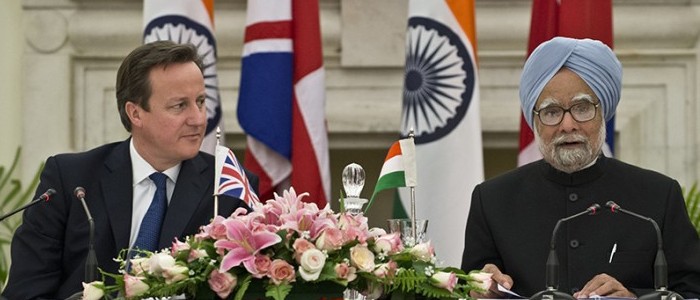David Cameron, the UK prime minister has landed on India soil. This is his second visit since he became prime minister in 2010. He brings with him the largest ever delegation of British business accompanying a UK premier. Clearly he is a man on a mission. And India is important.
I was asked on BBC Radio this morning whether the UK needs India more, or whether India needs UK more. Manmohan Singh has thus far not led a delegation to the UK under David Cameron’s watch, and I don’t hear speaking about doubling bi-lateral trade with the same vigour (though Manmohan Singh is not a man of many words in any case).
But clearly by the overtures, the UK is doing all the chasing.
The reality is that both countries need each other – for both economic and strategic reasons. And even if they didn’t age old relationships of this nature don’t just fizzle away – well David Cameron certainly does not want that to happen, and I am sure the Indians don’t either.
The timing of visit is not however not ideal. It comes in the midst of a huge corruption scandal involving UK based Augusta Westland. The allegation being that Augusta Westland paid bribes to Indian officials to win a major helicopter manufacturing contract. David Cameron will rightly be seeking to save the deal and therefore save UK jobs. The Indians don’t seem to be in a mood to listen. They want answers.
Europe
The visit also comes on the back of growing confusion in India over the UK’s position in Europe. There are now over 700 Indian companies with a presence in the UK. Of these 70 are listed on the London Stock Exchange.
UK has always been viewed, and indeed marketed by the UK as a natural launch pad for Indian companies into EU. The question therefore Indians are asking after David Cameron’s recent referendum announcement – is whether the UK backs the EU or not? It is after all India’s largest trading partner.
Companies need to make long term decisions. The ambiguity does not help.
Immigration
Domestic rhetoric on toughening immigration rules, also has confused a lot of Indian business people. Indians are saying you but want our business but you don’t want our people. David Cameron will have a lot of explaining to do. But he is doing the right thing. He is engaging with India. He is talking of a genuine partnership and building on his last visit, and the work started by previous UK governments.
Deeper Relations
There has been a consistent push by the UK for greater relaxation of foerign direct investment norms, particularly in the financial services and insurance sectors. I don’t think we will see any major concessions from the Indian government of FDI policy. Why would they make such major policy announcements during a UK prime ministers visit? I don’t think any one expects that either.
David Cameron should stick to the theme of deepening existing relationships rather than talking about some kind of vague fluffy special relationship. Talk about partnerships, about capital flows (after-all London is the world’s leading financial hub) and deepening partnerships through technology collaborations. He should also be talking about working with regional governments such as Bihar and of course Gujarat.
Frankly, visiting Delhi and Mumbai lacks certain imagination. He could have been more imaginative and hosted a roundtable with some of the states where British interests are significant. That is where the real growth is – rather than play safe in Delhi and Mumbai.
Jobs and Skills
He should clarify his position on immigration and Europe. But if he wants to see a major push in UK-Indian trade & investment, I would like to see him announce a special boost to support job creation and skills development in both countries. That is the key and the core of a sustainable long term and deep partnership.
I am off the Delhi now to join the jumbo delegation and hopefully help in getting everyone down to business.







